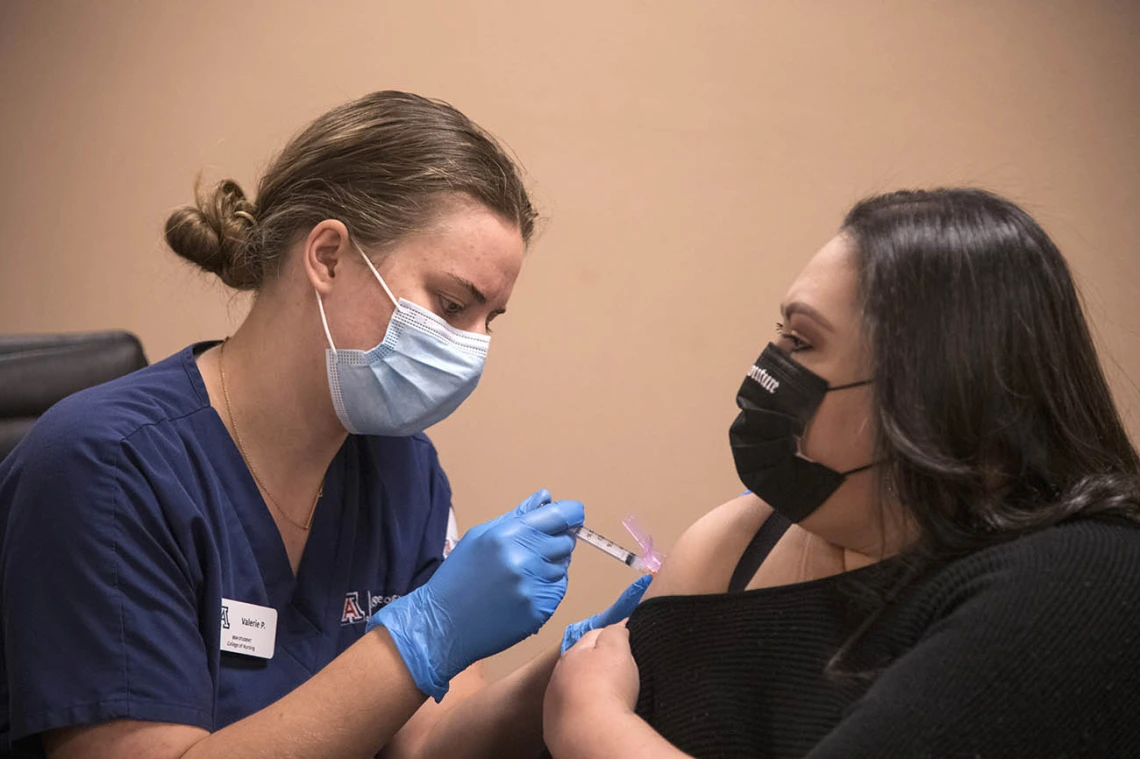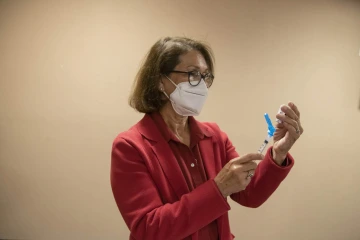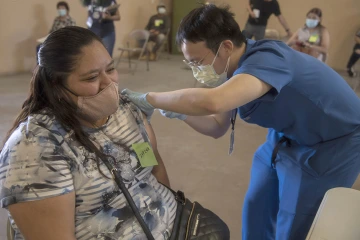MOVE UP Outreach Program Administers 36,000 COVID-19 Vaccines in Arizona’s Rural and Underserved Communities
The mobile health MOVE UP program has hosted hundreds of COVID-19 vaccination clinics for hard-to-reach populations in central and southern Arizona.

College of Nursing student Valerie Pedersen gives a woman a COVID-19 vaccine at a MOVE UP clinic at the Consulate of Mexico in Douglas hosted by the UArizona Health Sciences in partnership with the Cochise County Health Department.
More than 36,000 COVID-19 vaccines have been administered in rural communities throughout Arizona thanks to the Mobile Outreach Vaccination and Education for Underserved Populations (MOVE UP) program, a coordinated effort at the University of Arizona Health Sciences.
People in Arizona’s outlying communities often are isolated due to language, income and transportation barriers, making mobile health units like those at the UArizona Mel and Enid Zuckerman College of Public Health a godsend. That’s been particularly true during the COVID-19 pandemic.

Cecilia Rosales, MD, MS, associate dean for of community engagement and outreach at the Zuckerman College of Public Health, prepares vaccines at the Consulate of Mexico in Douglas, Arizona.
Speaking in Spanish, Sergio Lemu, a farmworker originally from Guatemala, agreed. Lemu got his COVID-19 vaccine at the community center in Aguila, Arizona, an agricultural town 90 miles west of Phoenix.
“The time we have is very limited, and we don’t have the transportation to get to places. We go to work very early and leave very late,” Lemu said. “Having this mobile unit service has helped us tremendously.”
The Zuckerman College of Public Health’s Primary Prevention Mobile Health Unit Program delivered more than 36,000 COVID-19 vaccines to hard-to-reach communities through October. A new digital dashboard summarizes the work of the MOVE UP program, which operates with support from UArizona Health Sciences, state and county health departments, and volunteers from each of the five Health Sciences colleges.
“We have continued to collaborate diligently with our community partners on vaccinations and basic health screenings,” said Cecilia Rosales, MD, MS, who leads the MOVE UP and Mobile Health Unit programs and is the associate dean of community engagement and outreach as well as Phoenix campus programs in the Zuckerman College of Public Health.
MOVE UP has hosted hundreds of mobile COVID-19 vaccine clinics across Maricopa County and three border counties – Cochise, Santa Cruz and Yuma. In Arizona’s fourth border county, Pima, COVID-19 vaccine mobile outreach was led by the Federal Emergency Management Agency.

Alvin Wong, DO, a clinical associate professor with the College of Medicine – Phoenix, administers a COVID-19 vaccine to a patient at the community center in Aguila, Arizona, a rural agricultural community west of Phoenix in Maricopa County.
MOVE UP administered 15,184 COVID-19 vaccines through October in Maricopa County – home to the nation’s fifth largest city, Phoenix, as well as large swaths of rural countryside. Nearly 20,000 doses were given at U.S. Customs and Border Protection ports of entry in Douglas, Naco, Nogales and San Luis, Arizona.
“Delivering more than 36,000 COVID-19 vaccines since February is an amazing accomplishment and a great contribution to the state’s public health, particularly among individuals and communities who may find it more difficult to access care,” said Michael D. Dake, MD, senior vice president for UArizona Health Sciences.
More than 10,000 COVID-19 vaccines were administered to people in Santa Cruz County.
“What they’re doing is a great thing. It’s trying to get all the border communities – particularly the hard-to-reach populations – access to vaccines,” said Jeff Terrell, health services director for Santa Cruz County.
On Sept. 15, Ricardo Piñeda, Mexican consul in Douglas, Arizona, presented the Ohtli Award to Dr. Rosales on behalf of MOVE UP. The award is given by the Mexican government to individuals who have aided, empowered or positively affected the lives of Mexican nationals in the U.S. and other countries.

